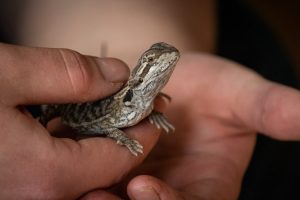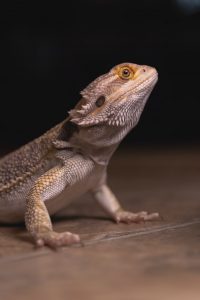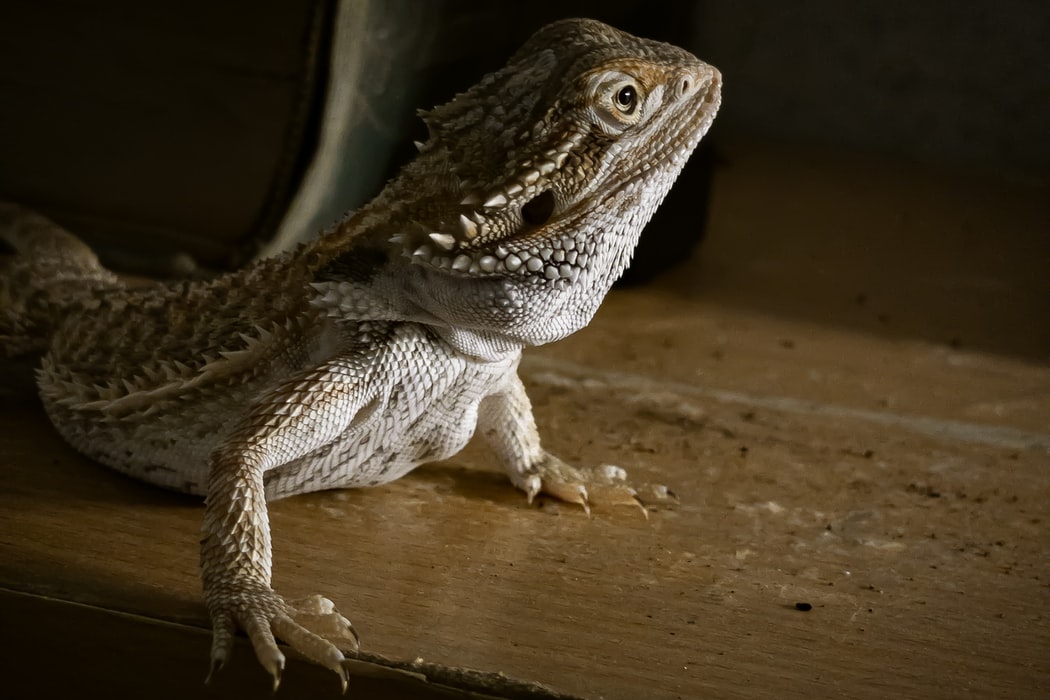Owning a pet bearded dragon is an amazing experience. Each has its own fun personality and it is a joy to get to know your new pet. One thing that we must do though is keep our bearded dragons happy and healthy, it is the key to pet ownership and in this guide I am going to show you how you can tell if your bearded dragon is happy, healthy or even stressed. Make sure you have a happy bearded dragon.
You can make your bearded dragon happy with the right tank accessories.
Working out how your happy bearded dragon feels.
There are various signs that can indicate your bearded dragon is happy, ill or stressed.
You should be able to tell if your bearded dragon is happy and healthy by the following observations:
Healthy looking skin – Bearded dragons with healthy skin will have a rich color and their scales will be tightly closed. If your bearded dragon appears pale, their scales are open and the animal appears dull then it may mean they have a disease or parasite problem. Males can also become dull if they are no longer interested in breeding with females.
Bright eyes – A healthy and happy bearded dragon will show characteristics of having bright eyes such as wide and clear irises, rapid blinking when stimulated or excited and open oriented pupils (not constricted). If any of these signs are absent then this could mean there is an underlying problem that needs to be looked at by a vet urgently.
Clear nose – The nose of a happy and healthy Bearded Dragon may also show other signs the animal is well. A clear red colored nostril that is not covered in mucus shows that the respiratory system is working correctly and there is no upper respiratory problem present in the system.
Ears – The ears of a happy and healthy bearded dragon should be clear in color and should wiggle when the animal is excited. If the ears appear to be stuck or atrophied then this may mean there has been some sort of injury or infection causing obstruction to the normal function of the ear.
Tail – The tail of a healthy bearded dragon should be curled and twisted to one side with a visible anus in the end. If this is not accurate then this could mean that there are issues with the cloaca or tail region which may indicate illness or parasites.
Spiracles – spiracles on bearded dragons are located at both ends of their skull just above their eyes. If these are not open then this can show lethargy or lack of oxygen flow through that area which could mean that you need to visit a vet
Temperature – Your bearded dragon’s temperature should be kept between 86 °F and 90 °F. If they are below 86 °F then they are lethargic and may need to be given more food because they simply aren’t able to digest their food properly. If your beardie is above 90°f it may show a tendency for aggression toward other dragons (this is called “sunning out”).
Signs that you have a happy bearded dragon:
Below are some of the signs that you can look out for to see if your bearded dragon is happy.
- Their skin is healthy and vibrant.
- Eyes are bright and alert.
- nose is clear of mucus.
- Ears are full, not atrophied or stuck in place.
- Tail is curled and upright.
- The beardie’s spiracles are open.
- Your Bearded dragon is alert and active.
- Temperature between 86°F and 90 °F.
- The bearded dragon may keep still and relaxed in the warmth of your hand whilst handling and not showing any aggression towards you.
- When fed the bearded dragon eats the food promptly.
- Basking in the heat in a relaxed state.
- Gaping is a sign that your beardie is happy and healthy.

A happy bearded dragon will be relaxed when being handled.
Signs that your bearded dragon may be stressed:
Signs of dehydration such as sunken eyes, skin that is tight and dry, bones that are protruding through their skin and/or dark tongue.
A beardie that is constipated will have very slow movement and may be hiding toward the back of its cage. In severe cases, a beardie may go up to 6 weeks or longer without passing any feces.
Constipation can occur if the dragon does not eat enough greens or if they are suffering from some sort of ailment that prevents them from being able to digest food properly.
A dragon who is scared, will lay on their stomach with their legs close to their body and will generally tremble or occasionally flick their tongue rapidly at you. This is also a sign of either illness or parasites in the system.
Changes in diet – drastic changes in diet could cause your bearded dragon to become stressed. If your new dragon seems to be eating less than usual then they may be stressed about something in its environment such as lighting levels, temperature or the presence of other dragons.
A dragon that is lethargic and unable to wiggle its tail or use its nose to smell out food or water. This could mean the dragon is very ill and should be seen by a vet as soon as possible.
Egg laying problems; egg binding can occur if the female hasn’t been put on a good calcium/D3 supplement routine that meets her needs and it is best to have a vet check over any female that has stopped laying eggs, even if she just lays one egg per season.
Signs of an egg bound female are usually seen within 24 hours after eggs are laid with signs of agitation, restlessness and pain being present in a lot of cases where the eggs have been retained too long in the body cavity because they had not calcified enough for them to be passed through the cloaca via normal means.
Why it is important to keep your bearded dragon happy and healthy:
We all know happy bearded dragons are very magical creatures that have bright and amazing colors, patterns, and behaviors. However, they need to be kept in a happy and healthy environment to survive.
“A happy bearded dragon is a healthy dragon”

This happy bearded dragon is looking inquisitive.
Bearded dragons can suffer from stress and unhappiness. If this is the case then your bearded dragon is likely suffering in either one of 2 ways:
- Stress from being bullied by the other dragons/animals in its habitat or over-crowded in its enclosure
- Stress from having too little or too much room in their habitat/enclosure.
If you are having problems with your dragon getting along with other dragons or animals in its environment then you may need to find a new home for one of the dragons or animals, if not, you may need to separate the bearded dragons while they get used to their new home.
You should definitely not keep two males (or more) together unless there’s enough space for both of them. The reasoning behind this is because males are territorial by nature and are very aggressive toward each other if they don’t have enough space (this can cause stress among your dragons).
Ways to keep your bearded dragon happy:
Bearded dragons are fairly easy to keep as pets and with a little care they are generally quite easy to keep happy. Below are some of the things you should make sure to do to keep your happy and healthy.
Diet.
Bearded Dragons require a suitable and very healthy diet which can be acquired by feeding them large crickets as their main source of protein. Males generally need more protein than females as they are larger. It is recommended that fresh greens should be given daily to the dragon but not as part of their primary protein source.
Correct lighting.
The lack of proper lighting is one of the biggest reasons why bearded dragons suffer unnecessary stress from their environment. Most of the bulbs on the market, although they claim to give off UVA & UVB rays, do not produce these rays in sufficient amounts for your dragon to thrive on its own without risking problems such as metabolic bone disease or stress related behavior issues.
Argon bulbs are the best kind of bulb to get for your dragons as they emit UVB rays in a way that the body absorbs them better than other sources of UV light on the market.
Clean and safe water.
Chlorine and chlorinated water that is found in tap water or pet stores can be lethal to your bearded dragon because it causes severe damage to their mouth, throat, and lungs. If you use tap water to rinse their cage then you must allow time for the chlorine to evaporate before they can safely drink from it (you can use a cup with a lid and fill it with non-tap water to provide fresh drinking water instead).
When changing their water always make sure you do not leave old stagnant or chlorinated water out for longer than 30 minutes before changing.
Conclusion:
There are definitely other factors that determine if your bearded dragon is happy or not but without proper UV lighting, water condition and diet, your dragon may be showing signs of stress even though it may seem otherwise. Bearded dragons are very intelligent and complex creatures, they need to have a good quality of life to survive in captivity and thrive as long as possible
